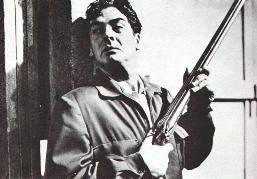
Back at Twentieth, Victor rejected a co-starring role in the Tyrone Power-Susan Hayward action feature, Untamed (1955), but he did agree to star in the Richard Fleischer-directed Violent Saturday (1955), about the carefully planned heist of a bank in an Arizona mining town. The robbery, engineered on a typically peaceful Saturday at noon by three cold-blooded crooks (portrayed by Lee Marvin, Stephen McNally, and J. Carrol Naish) irrevocably affects the lives of certain townspeople. Victor is the Arizonian family man who proves to be the hero. During the filming of Violent Saturday, he was incapacitated for a few days with severe "lumbo-sacro strain" suffered when he smashed into a door while dodging moving props on the set.
Violent Saturday also represented his final screen work for Twentieth Century-Fox. It ended a liaison of fifteen years and nineteen Fox features. Like fellow actor Tyrone Power, who also would soon depart the lot, Victor and the studio had drained one another nearly dry of possible variations in casting. Particularly under the forthcoming Buddy Adler regime at Fox, the celluloid product would be geared to the younger filmgoer, and feature less mature players such as Robert Wagner, Jeffrey Hunter, Don Murray, Bradford Dillman, Tony Randall, Pat Boone, and Cameron Mitchell.
In 1955, Victor was again sued for divorce. On November 8, Dorothy Berry Mature, in a Santa Monica courtroom, was awarded a default divorce consisting of a $500,000 settlement. (The couple had separated, finally, on August 13, 1954. On December 3, 1954, she obtained a $1,200 monthly temporary alimony pending trial of the divorce suit.) Her attorney revealed that Mature's earnings included $2,750 a week, as well as an additional $25,000 a year from stocks and bonds. Dorothy informed the court, "Nine-tenths of my married life has been spent waiting for Mr. Mature to come home."
Although he was thirty-nine years old--a dangerous age for any screen leading man--Victor was still in excellent physical condition. If he could no longer command a leading spot at a major studio, there were the lesser film houses which welcomed his acting services. He rejected the obvious opportunities that television and a lucrative video series would provide (it would be too much work), and instead chose to negotiate a six-film pact with United Artists which extended over a five-year period and allowed Victor's production company to participate in the proceeds.
Interspersed with his United Artists ventures were several action entries for Harry Cohn's Columbia Pictures. He appeared as a trapper turned cavalry scout in The Last Frontier (1956), with Guy Madison and Robert Preston, each of whom was also trying to hold onto sagging movie careers, and Anne Bancroft who was still attempting to find her slot in the acting trade. Anthony Mann directed this soldier-versus-Indians feature with little distinction. Safari (Columbia, 1956), filmed in Africa by Warwick Productions of Britain, was a Western-type story set in the Kenya Bush country. Victor is a hunter whose family is done in by the Mau Mau's, but he overcomes their evil plot and wins the hand of stern Janet Leigh. In The Sharkfighters (United Artists, 1956), most of which was filmed off the coast of Cuba, Mature is a U.S. Naval lieutenant commander who has maintained a personal vendetta against sharks. His destroyer sank during World War II and his crew had been devoured by the hungry scavenger fish. "Sharks got lousy table manners," he tells us, and takes to the ocean waters with knife in hand in a futile attempt to exterminate them all.
Even though his celebrity heydays of the 1940s were long gone, Victor was still good news copy. He confided to the press on the subject of matrimony, "The trouble is that I can't get along without a wife, and when I have one, I can't live with her."
From the Cuba location sites of The Sharkfighters, Victor journeyed to England to join Warwick Productions for four films, all released in the United States by Columbia on double-bill programs. It was ironic that at this later stage in his career he finally would be playing a wide variety of action leads. In Zarak (1956), lensed in England, India, and Burma, he had the title role, a goatee, a turban, and buxom Anita Ekberg. He portrayed a bad man of India who plagues the British with his marauding sorties.
The Ken Hughes-directed The Long Haul (Columbia, 1957) was a far more sturdy film project than most of Mature's efforts at this time. Filmed in England and Scotland, it told of an American ex-G.I. (Victor) whose British wife (Diana Dors) maneuvers him into settling down near her parents in Liverpool. Then, because of her ambitious dreams, she persuades him to pursue several lucrative and dishonest pastimes. One rather harrowing segment of the film details a frenzied truck drive along narrow stony street sides. Said Variety of Mature's performance, "[He] makes a convincing figure of the straight-forward guy who turns cheat on his wife and his work."
